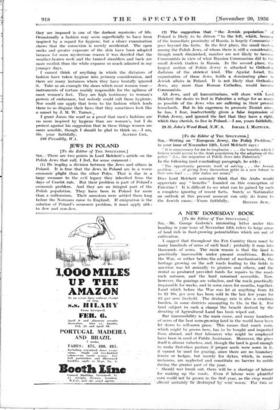A NEW DOMESDAY BOOK [To the Editor of Tan SPECTATOR.]
SIR,—Mr. George Godwin's interCliting letter under this heading in your issue of November 13th refers to large areas of land rich in food-growing potentialities which are out of cultivation.
I suggest that throughout the. Fen Country there must be many hundreds of acres of stieli-landi probably it runs into thousands of acres. The' Main -reitsdn is that the land is practically inaccessible -under -present conditions. Before the War, or rather before.the advent of mechanisation, the herbage growing on the soft roads leading to the fields in question was let annually to -grillers and others, and the rental so produced -provided. funds for repairs to the roads each autumn; and the land remained accessible. Now, however, the grazings, are valueless, and the roads practically impassable for weeks, and in some cases for months, together. Land which before the War was- let at anything from £2 to £2 /OA. per acre has been kW hi •the last few years for £3 per acre freehold. The drainage rate is also a crushing burden, in some districts amounting to 15s. in the 1.. For land subject to such a charge the benefit derived by the derating of Agricultural Land has been wiped out.
But inaccessibility is the main cause, and many hundreds of acres of the best corn-growing land in the world have been let down to self-sown grass.'" This means that much corn, which might be grown here, has to be bought and imported from abroad, and that labourers who might be employed have been in need of Public Assistance. Moreover, the grass itself is almost valueless, and, though the land is good enough to make first-class pasture if 'proper seeds were sown in it, it cannot be used for grazing, since there are no boundary fences or hedges, but merely fen dykes, which, in many instances, are neglected and constitute no barrier to cattle during the greater part of the year.
• Should war break out, there will be a shortage of labour for making up the roads. Even if labour were plentiful corn could not be grown in the first -year, as the crop would
altnost'Certainly-1* -diSSfitored–byrwitelv6rnif:. MO or
three seasons at least therefore ships (or at any rate those which could evade the submarines) would,be bringing in corn which ought to be grown here.
If the roads were.put in hand forthwith, labour at present unemployed would be absorbed in quarrying, and carting the material as well as in making the roads themselves,_ and the land would at once come into full use. Its assessable value would be increased, and the poundage of the drainage rate on other land still in cultivation reduced, and Agricul- tural labourers would be kept off the dole. The roads of course would only carry slow moving traffic, and would not require the costly finish of modern motor roads.
The cost need not be entirely a national one, especially if a voluntary scheme • were organised whereby owners of a certain fraction of land served by each road could compel the others to join in. The cost could be defrayed as to such part as was not borne by the Local or National Governments, by long term loans (repayable over a term of years on the lines of loans by the Agricultural Mortgage Corporation) which all owner-occupiers and most landowners (with– or without contributions from their tenants) would be willing to pay. The part of the cost borne by the Government or Local Authority would cancel out against the saving in Public Assistance.
I suppose an Act of Parliament would be necessary, but the urgency of the problem seems obvious. It is no use rearming if the nation is to starve.—Yours faithfully,





























































 Previous page
Previous page